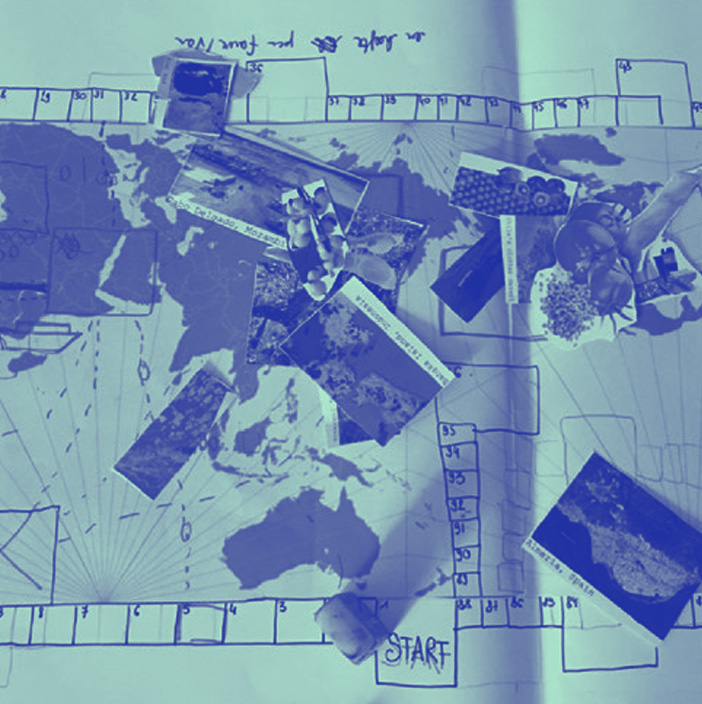Struggling for Design for the Pluriverse in the Global North
Main Article Content
Abstract
This article explores the difficulties of conducting pluriversal design in the Global North. The point of departure is Arturo Escobar’s discussion on design for the pluriverse, which is a critique of modernity and unsustainability. The analysis centers on a project to develop a game to uncover the unsustainability integral to modern commerce, in the form of value chains of products produced in the Global South and consumed in the Global North. The researchers follow and document their experience with the development of the game aimed at sensitizing school students in the Global North to the injustices, resource overuse, and violence integral to value chains. The analysis describes how the intention to apply pluriversal design principles risks being betrayed by the same designers committed to them, because of their embeddedness in modernity. The authors propose two concrete strategies: first, recognizing that activating pluriversal principles will create discomfort in the designers and the design process; second, developing a vision to activate pluriversal principles.
Article Details
References
Alimonda, H. (2015). Mining in Latin America: coloniality and degradation. In The international handbook of Political Ecology (pp. 149-161). Edward Elgar Publishing.
Barcham, M. (2022). Weaving together a decolonial imaginary through design for effective river management: Pluriversal ontological design in practice. Design Issues, 38(1), 5-16. https://doi.org/10.1162/desi_a_00666
Ceschin, F., & Gaziulusoy, i. (2019). Design for Sustainability: A Multi-level Framework from Products to Socio-technical Systems. Routledge.
Dutton, Z. (2023). How climate change board games could turn play into action. Popular Science. Accessed May 2023: https://www.popsci.com/environment/climate-crisis-game/
Escobar, A. (2018). Designs for the pluriverse: Radical interdependence, autonomy, and the making of worlds. Duke University Press.
Fry, T. (2017). Design for/by “the Global South”. Design Philosophy Papers, 15(1), 3-37. https://doi.org/10.1080/14487136.2017.1303242
Haukeland, I. & Brix, E. (Hosts) (2022, December 31). Soy, Evictions and Seed Sovereignty in Paraguay (No. 31). [Audio podcast episode] In Jordi i Hovedet. Miljøorganisationen NOAH. https://open.spotify.com/episode/6AckopZvyOAIUYCx2OZ1Ir?si=aecbdbd1396e4e9f
Henoi (n.d.). About us. Heñói. Accessed May 2023: https://henoi.org.py/index.php/en/are-2/
Jorgensen, D. L. (1989). The methodology of participant observation. Participant Observation, 12-26. https://doi.org/10.4135/9781412985376
Karnani, A. (2009). The bottom of the pyramid strategy for reducing poverty: A failed promise. New York, USA.
Kothari, U. (2005). Authority and expertise: The professionalisation of international development and the ordering of dissent. Antipode, 37(3), 425-446. https://doi.org/10.1111/j.0066-4812.2005.00505.x
Law, J. (2015). What's wrong with a one-world world? Distinktion: Scandinavian Journal of Social Theory, 16(1), 126-139. https://doi.org/10.1080/1600910X.2015.1020066
Loorbach, D. (2010). Transition management for sustainable development: a prescriptive, complexity-based governance framework. Governance, 23(1), 161-183. https://doi.org/10.1111/j.1468-0491.2009.01471.x
NOAH (2023). Miljø og Mad #5 – Dansk kolonialisme og klima. NOAH.dk. Accessed May 2023: https://noah.dk/kalender/miljoe-mad-5-dansk-kolonialisme-og-klima?fbclid=IwAR0MAIlI4-21b9_Wa4pOpNW7NXwGwMKqSmHcmvBHEZwnCRUzUlFRGrNtfL0
NOAH (n.d.b). NOAH’s vision, mission and organizational values. NOAH.dk. Accessed May 2023: https://noah.dk/om-noah/formelle-dokumenter
Sengers, P., Boehner, K., David, S., & Kaye, J. J. (2005, August). Reflective design. In Proceedings of the 4th decennial conference on Critical computing: between sense and sensibility (pp. 49-58).
Taboada, M. B., Rojas-Lizana, S., Dutra, L. X., & Levu, A. V. M. (2020). Decolonial design in practice: Designing meaningful and transformative science communications for Navakavu, Fiji. Design and Culture, 12(2), 141-164. https://doi.org/10.1080/17547075.2020.1724479
Tuninetti, Á. (2023, April 27th) [Personal communication].
Tunstall, E. D. (2023). Decolonizing Design: A Cultural Justice Guidebook. MIT Press.


